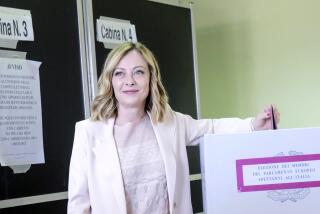Kurds Hope for Gains in Turkish Vote : Election: They could double their strength in Parliament. The outcome of today’s balloting may be a coalition government by President Ozal’s foes.
- Share via
DIYARBAKIR, Turkey — A clutter of election posters has replaced the clatter of American helicopters here in southeastern Turkey, where a national election today has become a referendum on support for a national cause by Turkey’s long-suppressed but suddenly assertive Kurdish minority.
On the national level, forecasts are for a hung jury that will probably produce a coalition government by foes of President Turgut Ozal. But here in the homeland of Turkey’s 12 million Kurds, unprecedented gains are expected for candidates arguing the cause of Kurdish nationalism.
“We are going to Parliament to be the voice of Kurdish liberation. We don’t believe that this will be the road to our salvation, but we have always held out our hand. It is up to the Turks to take it,” said firebrand Leila Zana, wife of a former Diyarbakir mayor jailed for 12 years for his Kurdish nationalism.
Zana is a shoo-in for Parliament from Diyarbakir, the world’s largest Kurdish city, where radical nationalists could win six of eight seats. Overall in the southeast, nationalists of the Kurdish People’s Labor Party could win up to two dozen seats in a 450-member national Parliament. That would more than double their number from the last election in 1987.
The nationalists’ campaign, as nominal members of the Social Democratic Party, has been punctuated in the southeast by violence of a Kurdish guerrilla movement that has claimed about 3,300 lives since 1984.
As nationalist candidates were telling cheering crowds at one rally last week that their vote in today’s election would be “a vote for the Kurdish people,” the government announced the death of seven guerrillas, three soldiers and two civilians in clashes.
In a related development, Iraq reportedly has been arming the Kurdish rebels, apparently in revenge for Turkey’s cooperation with the allies in the Gulf War.
Quoting unidentified Turkish officials, Western diplomats and Iraqi Kurdish leaders, the New York Times reported Sunday that the number of battles in Turkey’s southeast between Kurdish rebels and Turkish forces has increased.
“A year ago they were little more than a ragtag terrorist band,” the Times quoted an unidentified Western diplomat as saying. “Now they have become a viable guerrilla army. Saddam Hussein sees the guerrilla movement as very useful.”
Over the weekend, there was also last-minute urban violence as Turks sorted among 5,000 candidates for an election in which none of the three major parties is expected to win the 32% it will need to assure a parliamentary majority.
But overall the colorful election campaign has been relatively free of violence.
Polls commissioned by major Turkish newspapers give an inconclusive lead to Suleyman Demirel, a four-time former prime minister who leads the center-right True Path Party. By most scenarios, Demirel, 67, will seek to build a coalition with Erdal Inonu, a former professor of nuclear physics whose Social Democrats run a strong third in the polls.
Currently the backbone of opposition to Ozal’s Motherland Party, the two parties promise to oust Ozal from the supposedly neutral presidency. But in general, they would continue his policies of rapid modernization with a Western tilt in this Muslim nation of 57 million.
Ozal was a key and avid allied supporter in the Persian Gulf crisis and basked in American praise. By now, though, he is controversial enough to be seen as a liability by the party he founded and led into nearly a decade of political control.
Motherland, which finished second in all the polls and appears to have finished strongly, has built its campaign not around Ozal but rather the youthful figure of Prime Minister Mesut Yilmaz, a 44-year-old technocrat.
Yilmaz cites the economic achievements of the Ozal era. His opponents cite high inflation and allegations of corruption against Ozal and his family.
Demirel and Inonu vow to remove Ozal from a presidency he says he will retain until his elected term ends in 1996, but only a coalition of their forces could generate the necessary two-thirds majority in a Parliament bound to feature sniping from Islamic fundamentalists on the one side and fractious Kurds on the other.
Earlier this year, at Ozal’s behest, Parliament repealed prohibitions against speaking Kurdish in public. Kurdish music now blares across the southeast and Kurdish-language publications advance the nationalist dreams of a people living as minorities in Turkey, Iraq, Iran, Syria and the Soviet Union.
Turkey’s 12 million Kurds, about half of whom live in the southeast, are kinsmen of the half a million Kurds who fled into the Turkish mountains from Iraq last spring after Hussein crushed an uprising that followed the Gulf War. Diyarbakir became the principal supply point of a vast relief effort spearheaded by the U.S. armed forces that created a security zone in northern Iraq.
There are still several hundred thousand homeless Kurds sheltering from Hussein in mountain areas of Iraq near the Iranian border controlled by Kurdish-Iraqi insurgents, but the refugee crisis has ended in Turkey itself.
Turkey’s Election
Turks go to polls today in elections called a year early: VOTERS: 30 million aged 21 and over, out of a total population of 57 million.
AT STAKE: All 450 seats in unicameral Parliament for five-year terms.
ISSUES: 70% inflation rate and charges of government corruption by opposition.
CONTENDERS:
* Motherland Party, conservative, governing since 1983, led by Prime Minister Mesut Yilmaz, 44, economist.
* Social Democratic Populist Party, left-wing, led by Erdal Inonu, 65, former nuclear physics professor.
* True Path Party, center-right, led by Suleyman Demirel, 67, former prime minister deposed by military in 1971 and 1980.
* Democratic Left Party, center-left, led by Bulent Ecevit, 66, former prime minister, who ordered 1974 invasion of northern Cyprus.
* Welfare Party, Islamic fundamentalist, led by former deputy prime minister Necmettin Erbakan, 65, champions closer ties with neighboring Islamic states.
* Socialist Party, Marxist, led by Dogu Perincek, 49, former academic, imprisoned after 1971 and 1982 coups for heading illegal party.
Source: Associated Press
More to Read
Sign up for Essential California
The most important California stories and recommendations in your inbox every morning.
You may occasionally receive promotional content from the Los Angeles Times.












